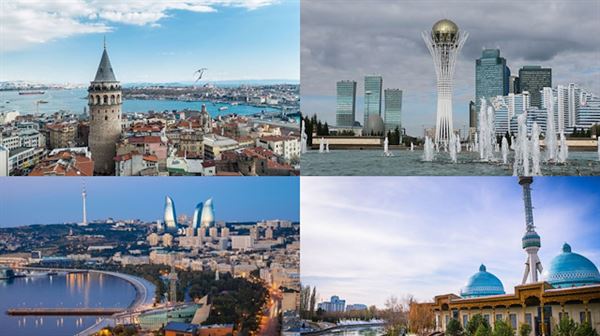Forget Geneva and New York, off late, the cities of Istanbul, Almaty, Astana, Tashkent and Baku have emerged as the favorite diplomatic destinations,
Forget Geneva and New York, off late, the cities of Istanbul, Almaty, Astana, Tashkent and Baku have emerged as the favorite diplomatic destinations, for conflict ridden countries to search for peace.
A common thread among all these cities is, they are all members of the world’s youngest forum, the Turkic Council, which includes Azerbaijan, Kazakhstan, Kyrgyzstan, Uzbekistan and Turkey, with Hungary and Turkmenistan as observers.
In an exclusive interview with Anadolu Agency, Secretary General of the Turkic Council Baghdad Amreyev explained that it was the geo-political positioning of these countries and more so, their friendly nature and attitude, that they have become centers of international mediation.
He recalled that it was Kazakhstan’s capital Almaty that brought together six world powers and Iran over the latter’s nuclear program in 2013. The initiative ultimately led to an agreement sharply constraining Iran’s stockpile, in return lifting some of the sanctions.
A seasoned diplomat Amreyev, who served as an advisor to two prime ministers of Kazakhstan since 2014, until he took over as the secretary general of Turkic Council last year, recalled that the Iranian nuclear issue was very complicated and there was a wide gap between Iran and other parties.
“What proved key was that Kazakhstan had good relations with all the parties. Since it also had a huge experience to deal with nuclear issues, the parties also relied upon us,” he said. After the Iranian experience, Kazakhstan achieved a big diplomatic success getting Russia, Turkey and the main actors involved in the Syrian crisis to sit across the table, when all other initiatives had failed. “Astana initiative is so far the most successful initiative that has established several de-escalation zones, freezed situation and stopped fighting in Syria,” he said.
Amreyev, who has also served as Kazakhstan envoy in Iran, Saudi Arabia and several other Middle East countries, said the other Turkic Council member, Uzbekistan due to its experience in Afghanistan, played a major part to get all parties together in Tashkent. It helped big powers, later to pick up threads and continue negotiations. Azerbaijan has also launched an important initiative promoting dialogue between different cultures in Baku. It recently also hosted the Non-aligned Movement (NAM) Summit.
– Historical linkages essential in successful diplomacy
What clinched for the late Kazakhstan President Nursultan Nazarbayev and his successor Kassym-Jomart Tokayev, when all others had failed, was his country’s historical ties with Syria, revealed the senior diplomat.
“The friendly relations between Kazakhstan and Syria have deep historical roots. Our great ancestor Al-Farabi, who was born on Kazakh soil in the city of Otyrar and Sultan Zahir Beybars rest in Damascus. These outstanding personalities serve as a spiritual and cultural bridge connecting our countries,” added Amreyev, emphasizing that history plays a significant role in diplomacy.
A multidimensional personality, Al-Farabi (872-950 A.D.) was a jurist, philosopher, scientist and mathematician who is often called “the Second Teacher”, following Aristotle, who is known as “the First Teacher”. Credited with preserving the original Greek texts, he is also known as connecting the West and the East. Baibars, also known as al-Zahir Rukn al-Din Baibars (1223-1277) was the fourth sultan of the Mamluk Bahri dynasty. He was one of the commanders that inflicted a defeat on the King Louis IX of France.
“Because of these historical linkages, Kazakhstan was interested in return of peace in Syria. Astana process is the best example of a successful mediation in recent times. Our countries are young, but they have proved more effective and succeeded in bringing peace to the world, than bigger powers,” said the Turkic Council secretary general.
Among the many peace deals and meetings hosted by the Turkic Council members, the major ones included Istanbul process that fathered Heart of Asia dialogue on Afghanistan, Almaty Iran deal, Tashkent dialogue on Afghanistan and Bishkek (Kyrgyzstan) Protocol, that resulted in a cease-fire agreement between Azerbaijan and Armenia in 1994.
Besides Astana process on the Syrian crisis, Kazakhstan also mediated the conflict of Ukraine. President Nazarbayev had helped to arrange the meetings in Minsk, capital of Belarus by practicing a shuttle diplomacy by visiting Kiev, the capital of Ukraine, and Moscow and having telephone conversations with other stakeholders to promote the peace talks.
“There was another mediation initiative jointly made by Turkey and Kazakhstan in 2019, when Turkey’s President Recep Tayyip Erdogan and Nazarbayev initiated the idea of Islamic rapprochement,” recalled Amreyev. Currently, more than 60% of all conflicts in the world occur in OIC countries.
Since Turkic Council nations are situated next to a vast region where acute active and frozen conflicts persist, its capitals may reflect philosopher poet Muhammad Iqbal’s famous Urdu verse titled, ‘An Eastern League Of Nations’, written a century ago “Asia’s Geneva let Tehran be, Earth’s book of statute, a new fate may see”. Turkic Council members may just need to replace Tehran in the verse with their cities and proceed to make prevention and peaceful resolution of conflicts, a central feature of their foreign policy.
